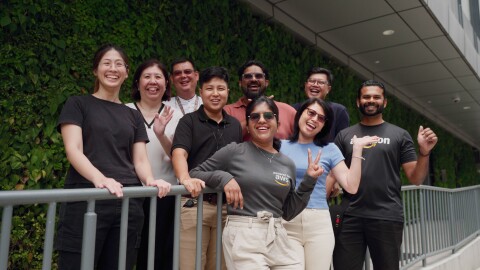We are encouraged by and welcome Asean's ambition to build an open, rules-based and dynamic digital economy through the Digital Economy Framework Agreement (DEFA) currently being negotiated in region. DEFA could double the size of ASEAN’s digital economy to US$2 trillion ($2.7 trillion) by 2030, emboldening business, investor, and citizen confidence in the region’s economic prowess.
Amazon Web Services (AWS) stands ready to support customers and partners in Asean as they embark on meeting even more ambitious digital aspirations, thanks to DEFA.
AWS’s commitment to digitally transform Asean
AWS is deeply invested in Asean. We started our first Asia Pacific Region in Singapore in 2010, the first outside the United States and Europe, where AWS has invested US$6.5 billion into cloud infrastructure. In 2021, we launched a new Region in Jakarta, Indonesia, with a planned investment of US$5 billion by 2036. In 2023, AWS also announced plans to launch new cloud infrastructure Regions in Malaysia and Thailand, with an estimated investment of US$6 billion and US$5 billion respectively by 2037. And we have announced AWS Local Zones in Bangkok (live), Manila (live), and Hanoi (to be launched).
There are thousands of active customers across Asean leveraging AWS to digitally transform—including government organisations such as GovTech Singapore and Indonesia’s Ministry of Education and Culture; large enterprises like Petronas and Globe Telecom; and startups like Carsome and Traveloka. We are committed to enabling Asean's digital ambitions, and are excited that DEFA will enable our customers and partners in Asean do so much more with cloud computing.
Ensuring DEFA raises the bar on digital trade
When implemented, DEFA would be the first regional digital economy agreement in the world with the aim of developing rules in areas such as digital trade, cross-border e-commerce, digital payments, and artificial intelligence, among others.
Asean has excellent precedents to draw inspiration from in developing DEFA. Singapore already leads the world in designing and promoting Digital Economy Agreements (DEAs) such as the pioneering Digital Economy Partnership Agreement signed with New Zealand and Chile, as well as numerous other bilateral DEAs with Australia, the UK, and South Korea.
To unlock the tremendous growth opportunity from the digital economy, Asean member states can consider the following policy principles for DEFA:
- Developing high-standard digital trade rules that promote cross-border data flows and discourage data localisation;
- Embracing international standards and best practices to accelerate adoption of emerging technologies, including the development of AI technologies;
- Promoting non-discriminatory and risk-based approaches to cybersecurity;
- Adopting best practices for the public procurement of digital technologies, including the use of fair procurement frameworks to enable digital transformation;
- And maintaining non-discrimination at the core of these high-standard digital trade rules.
Another policy framework that Asean may consider for DEFA is Japan’s initiative on Data Free Flow with Trust (DFFT), which emphasises the balance between promoting seamless cross-border data flows and establishing a foundation of digital trust to underpin such flows.
The DFFT framework recognises that while the free flow of data can drive innovation, inclusivity, economic growth, and the adoption of digital technologies, it must be complemented by measures that safeguard data protection, privacy, and security.
Uplifting the backbone of Asean's economy—MSMEs and startups
Asean is a truly unique region in that it has more than 70 million micro, small and medium enterprises (MSMEs), contributing 85% to employment, 44.8% to gross domestic product (GDP), and 18% to national exports. There is no doubt that MSMEs and startups are the backbone of the Asean economy.

By embracing seamless cross-border data flows and non-discriminatory digital trade rules, DEFA can enable MSMEs and startups in Asean 1) embrace digital transformation via cloud, 2) tap into customers across borders, 3) expand overseas, and 4) access digital tools that may not be available locally.
MSMEs and startups are particularly vulnerable to regulatory obligations, such as data localisation, as they increase the compliance and cost burden for small businesses with limited resources. This can raise barriers to access digital technologies, negatively affect regional competitiveness, and disincentivise small businesses from embracing digital transformation, culminating in limited growth opportunities.
Cross-border data flows can drive significant growth and innovation for small businesses. For example, Southeast Asia’s super-app, Grab began as a startup that grew 200 times in its first five years of operation on cloud, and is now available across 40 cities and has been installed on 38 million devices.
Another example is Carro, one of Southeast Asia's largest auto marketplaces, a startup that is embracing AI and machine learning, while also driving AI/ML and cloud skilling programs through the Carro x AWS scholarship.
Building strong regulatory foundations for a vibrant health-tech industry
Inclusive healthcare is a priority area of cooperation for Asean, and DEFA presents a unique opportunity to boost the region’s health-tech industry. By strengthening frameworks for cross-border health data transfers, particularly enabling regulations and guidelines for the transfer of sensitive health information across borders, DEFA can play a pivotal role in accelerating the digital transformation of the healthcare sector in Asean.

For example, under DEFA, data protection requirements for the transfer of health data can be made accountability-based rather than jurisdiction-based to ensure that the data owner is responsible for meeting requirements, regardless of where the data is physically stored.
DEFA negotiations can also promote the establishment of open standards for data interoperability, data management, availability, and service delivery to enable the secure collection and use of healthcare data. This can lay the groundwork for more patient-centred and connected healthcare systems built on secure-by-design cloud infrastructure.
The COVID-19 pandemic in particular highlighted the need for cross-border data flows and interoperability as innovative and secure cloud-based telehealth services became critical. From Doctor Anywhere scaling services up and down for its over one million online and offline users across Singapore, Thailand and Vietnam; to Halodoc that connects over 20 million monthly active users in Indonesia with 22,000 doctors and 1,000 certified partner pharmacies through its mobile and web applications—DEFA could unlock a new wave of digital innovation for healthcare in Asean.
Boosting agricultural productivity and progress with data free-flow
Agriculture is a key industry for many Asean member states, employing up to 60% of Southeast Asia’s workforce, and constituting over a quarter of GDP for some countries in the region. With the right set of digital trade rules, agricultural firms and workers can access cloud-based digital tools to 1) scale and streamline operations, 2) leverage smart systems to boost productivity and yield, and 3) implement sustainability and disaster mitigation best practices.

Agritech and farming companies, such as Sayurbox and HARA in Indonesia, or GreenFeed Vietnam, are leveraging cloud to help make smart and data-driven farming decisions. However, without access to digital technologies, this would not be possible. And limiting data flows can restrict the access to these technologies and hamper innovation for Asean businesses.
Even government agencies like Malaysia’s Federal Agricultural Marketing Authority (FAMA) are domestically leveraging cloud tools to meet changing needs of the food supply chain, and DEFA could help take such smart agro-food solutions beyond borders. This can drive inclusion and progress for traditional industries such as agriculture where the farmers are most at-risk of being left behind in the digital age.
The digital future is bright for Asean
The ongoing negotiations on DEFA stand as a potentially defining moment for Asean. The inclusive regulatory frameworks and high-standard digital trade rules that could result from DEFA may prove game-changing for the region, allowing for more connected markets, a much greater variety of available goods and services, and a more vibrant digital economy overall.
Annabel Lee is AWS's director for Asean public policy.













